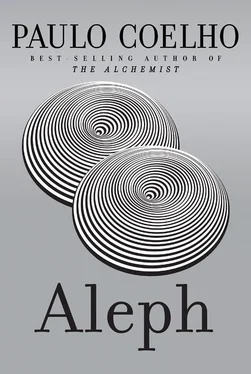He explains that the person representing me in Russia has not arrived. I remember the conversation with my friend the night before, but what does it matter? If she hasn’t turned up, that’s her problem.
I notice Hilal say something to my editor. She receives a brusque reply but doesn’t lose her cool, just as she didn’t when I told her we couldn’t meet. I am getting to like the fact that she is here more and more; I like her determination, her poise. The two women are arguing now.
I again ask the translator to explain what’s going on, and he says that my editor has asked Hilal to go back to her own carriage. Fat chance , I think to myself. That young woman will do exactly what she wants to . I amuse myself by observing the only things I can understand: intonation and body language. When I think the moment is right, I go over to them, still smiling.
“Come on, let’s not start off on a negative vibe. We’re all happy and excited, setting off on a journey none of us has ever made before.”
“But she wants—”
“Just leave her alone. She can go to her own compartment later on.”
My editor does not insist.
The doors open with a noise that echoes down the platform, and people start to move. Who are these people climbing into the carriages? What does this journey mean to each passenger? A reunion with their loved ones, a family visit, a quest for wealth, a triumphant or shamefaced return home, a discovery, an adventure, a need to flee or to find. The train is filling up with all these possibilities.
Hilal picks up her luggage—which consists of her backpack and a brightly colored bag—and prepares to climb into the carriage with us. The publisher is smiling as if she were pleased with the way the argument had ended, but I know that she will seize the first opportunity to take her revenge. There’s no point explaining that all we achieve by exacting revenge is to make ourselves the equals of our enemies, whereas by forgiving we show wisdom and intelligence. Apart from monks in the Himalayas and saints in the deserts, I think we all have these vengeful feelings because they’re an essential part of the human condition. We shouldn’t judge ourselves too harshly.
OUR CARRIAGE COMPRISES FOUR COMPARTMENTS; bathrooms; a small lounge area, where I assume we will spend most of the time; and a kitchen.
I go to my compartment, which consists of a double bed, a wardrobe, a table and a chair facing the window, and a door that opens onto one of the bathrooms. At the end is another door. I go over and open it and see that it leads into an empty room. It would seem that the two compartments share the same bathroom.
Ah, it was obviously intended for the representative who did not turn up. But what does that matter?
The whistle sounds. The train slowly starts to move. We all rush to the lounge window and wave good-bye to people we’ve never seen before. We watch the platform rapidly being left behind, the lights passing faster and faster, the tracks, the dim electric cables. I’m impressed by how quiet everyone is; none of us wants to talk, because we are all dreaming about what might happen, and no one, I’m sure, is thinking about what they’ve left behind but about what lies ahead.
When the tracks disappear into the black night, we sit around the table. There’s a basket of fruit we could eat, but we had supper in Moscow. The only thing that awakens everyone’s interest is a gleaming bottle of vodka, which we immediately open. We drink and talk about everything but the journey, because that is the present, not the past. We drink some more and begin to reveal what we all expect from the coming days. We continue to drink, and an infectious joy fills the room. Suddenly, it’s as if we’ve known one another all our lives.
The translator tells me something of his life and passions: literature, traveling, and the martial arts. As it happens, I learned aikido when I was young, and he says that if we get bored at any point and run out of conversation, we can always do a little training in the tiny corridor beside the compartments.
Hilal is talking to the same editor who hadn’t wanted her to get into the carriage. I know that both are trying to patch up their misunderstanding, but I know, too, that tomorrow is another day, and confinement together in a small space tends to exacerbate conflicts. Another argument is sure to break out. Not for a while, though, I hope.
The translator appears to have read my thoughts. He pours everyone more vodka and talks about how conflicts are resolved in aikido.
“It’s not really fighting. What we aim to do is calm the spirit and get in touch with the source from which everything comes, removing any trace of malice or egotism. If you spend too much time trying to find out what is good or bad about someone else, you’ll forget your own soul and end up exhausted and defeated by the energy you have wasted in judging others.”
No one seems very interested in what a man of seventy has to say. The initial euphoria provoked by the vodka gives way to a collective weariness. At one point, I get up to go to the toilet, and when I return, the room is empty.
Apart from Hilal, of course.
“Where is everyone?” I ask.
“They were being polite and waiting for you to leave so that they could go to bed.”
“You’d better do the same.”
“But there’s an empty compartment here—”
I pick up her backpack and bag, take her gently by the arm, and lead her to the end of the carriage.
“Don’t push your luck. Good night.”
She looks at me but says nothing and heads for her compartment, although I have no idea where that is.
I retire to my room, and my excitement becomes intense weariness. I place my computer on the table and my saints—who go everywhere with me—beside the bed, then I go to the bathroom to clean my teeth. This turns out to be a far harder task than I’d imagined. The glass of mineral water in my hand keeps lurching about with the movement of the train. After various attempts, I achieve my objective.
I put on the T-shirt I wear in bed, smoke a cigarette, turn off the light, close my eyes, and imagine that the swaying is rather like being inside the womb and that I will spend a night blessed by the angels. A vain hope.
WHEN DAY FINALLY DAWNS, I get up, change my clothes, and go into the lounge. Everyone else is there, too, including Hilal.
“You have to write a note giving me permission to come back here,” she announces, before she has even said “Good morning.” “I had a terrible time getting here today, and the guards in every carriage said that they would let me through only if—”
I ignore her last words and greet the others. I ask if they had a good night.
“No,” comes the collective response.
So it wasn’t just me.
“I slept really well,” says Hilal, unaware that she is provoking the general wrath of her fellow travelers. “My carriage is right in the middle of the train, and so it doesn’t lurch about so much. This is the worst possible carriage to be traveling in.”
My publisher seems as though he’s about to make some rude comment but restrains himself. His wife looks out the window and lights a cigarette to disguise her irritation. My editor pulls a face that says more clearly than any words: “Didn’t I tell you she’d be in the way?”
“Every day I’m going to write down a thought and stick it on the mirror,” says Yao, who also appears to have slept well.
He gets up, goes over to the mirror in the lounge, and sticks a bit of paper on it, which says: “If you want to see a rainbow you have to learn to like the rain.”
No one is too keen on this optimistic saying. One doesn’t have to be a mind reader to know what’s going through everyone’s head: “Good grief, is this what it’s going to be like for another nine thousand kilometers?”
Читать дальше






